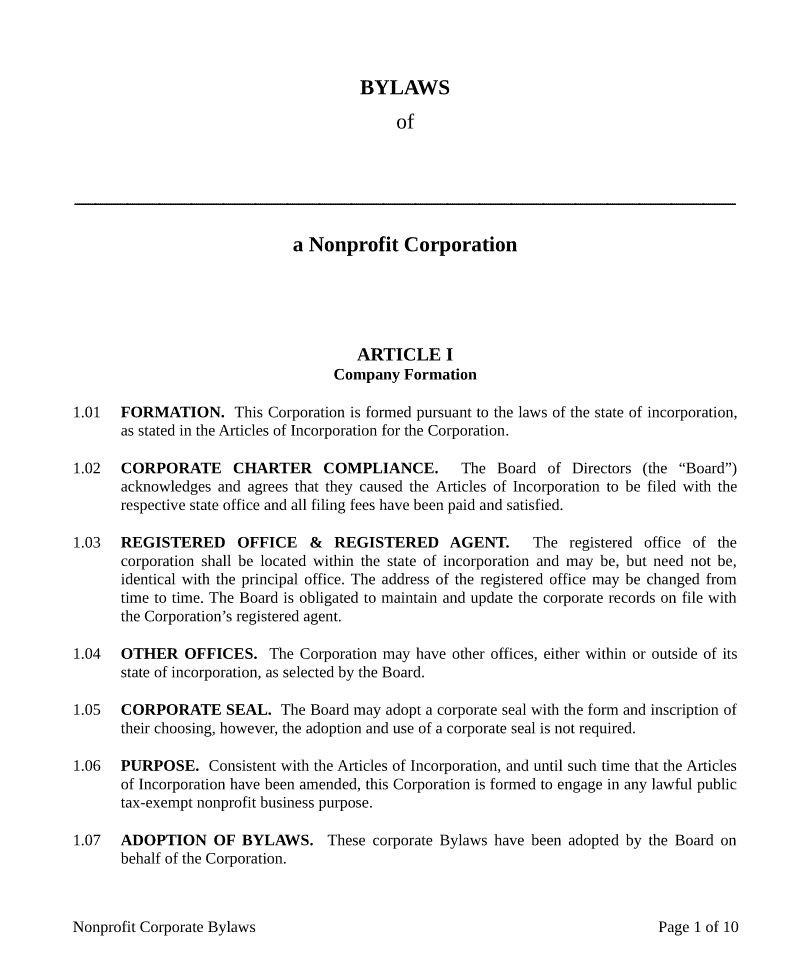North Dakota Nonprofit Bylaws
North Dakota nonprofit bylaws serve as the foundation for your nonprofit’s internal structure and operational procedures. Bylaws establish how your nonprofit will govern itself with definitive guidelines for actions such as voting, record keeping, and managing members. Your bylaws also protect your organization and its members by clearly describing members’ roles and obligations.
Bylaws are one of your nonprofit’s most important internal documents, so get started right with our attorney-drafted nonprofit bylaws template.
Why does a North Dakota nonprofit need bylaws?
Unlike your North Dakota Nonprofit Articles of Incorporation, your bylaws don’t need to be filed with the Secretary of State. With that being said, creating and adopting bylaws is still a crucial aspect of your nonprofit’s formation process. It’s also very probable that your bylaws will become public record. So let’s go over the main reasons your nonprofit needs strong bylaws.
1. Adopting nonprofit bylaws is good practice in North Dakota.
North Dakota Century Code § 10-33-26 states that a nonprofit “may, but need not, have bylaws.” However, adopting comprehensive bylaws is good business practice. Without bylaws, your nonprofit will be subject to the state’s default nonprofit corporation statutes. For example, your nonprofit would need to follow state-mandated procedures for holding meetings, managing board members, and so on. And, these guidelines may not align with how you would prefer to run your nonprofit.
2. Third parties will ask to see your bylaws.
It’s very likely that third parties will ask to see your bylaws. The IRS will require your nonprofit to submit a copy of your bylaws if you apply for tax-exempt status. Other third parties, such as banks, investors, landlords, and partnering organizations, may also request to see your bylaws before finalizing financial arrangements or other business dealings.
3. Nonprofit bylaws allow you more control over your nonprofit.
In the absence of bylaws, your nonprofit is more likely to face a dispute over contentious situations like removing a board member or dealing with a conflict of interest. Disputes can cause the state to look into your nonprofit, which could land your nonprofit in court. Bylaws help you maintain authority over your nonprofit.
Want to learn more? Check out our Guide to Nonprofits.
What do North Dakota Nonprofit Bylaws include?
Your bylaws should include essential information about your North Dakota nonprofit (such as its name, address, and purpose) and the detailed rules for how your organization should operate. Strong bylaws should include provisions for:
- announcing and holding board meetings
- voting and quorum procedures
- managing board members and officers
- compensating members
- serving or receiving legal notices
- dealing with conflicts of interest
- maintaining accounting and meeting records
- amending your bylaws
- dissolving your nonprofit
Your nonprofit can add other provisions as desired—so long as those provisions fall within the law and don’t contradict the information in your Articles of Incorporation.
Are nonprofit bylaws legally binding?
Yes. Your nonprofit bylaws are a legally binding agreement, and your members must adhere to the to avoid serious legal ramifications. In a court of law, your bylaws can be used to hold members accountable or quickly resolve disputes.
Are nonprofit bylaws public record?
Whether or not your nonprofit bylaws become public record depends on your organization. You could keep your bylaws private because you don’t need to file your bylaws with the state. However, if you want to obtain 501(c)(3) tax-exempt status, your bylaws will become public by default—you must attach a copy of your bylaws to your application, and the IRS makes all applications public. It’s also common for nonprofits to publish their bylaws to show transparency and strengthen their public image.
FAQs
No. Your board of directors can adopt your bylaws without signing them (they’ll probably even stand up in court), but doing so isn’t recommended. Getting signatures from your board is standard practice for a couple of reasons. For one, your bylaws will appear more official when shown to third parties. Signed bylaws also show that the board agrees to uphold your nonprofit’s mission and organizational integrity.
Yes. We recommend including a provision for making amendments in your bylaws If neither your bylaws nor your articles contain a provision for amending bylaws, you must follow the instructions provided in NDCC § 10-33-26.
According to NDCC § 10-33-26, your nonprofit bylaws can be adopted by a majority of your incorporators or your initial board of directors unless your Articles of Incorporation make other arrangements. Bylaws are typically adopted at your nonprofit’s first organizational meeting.
